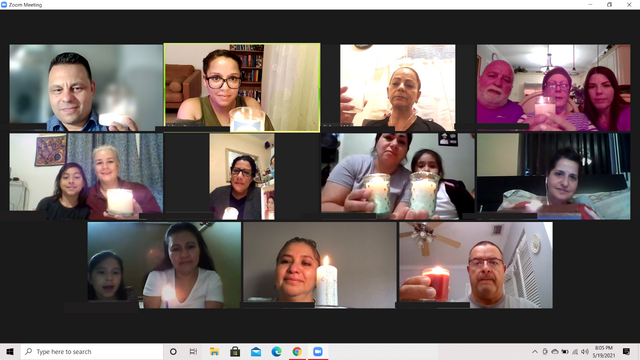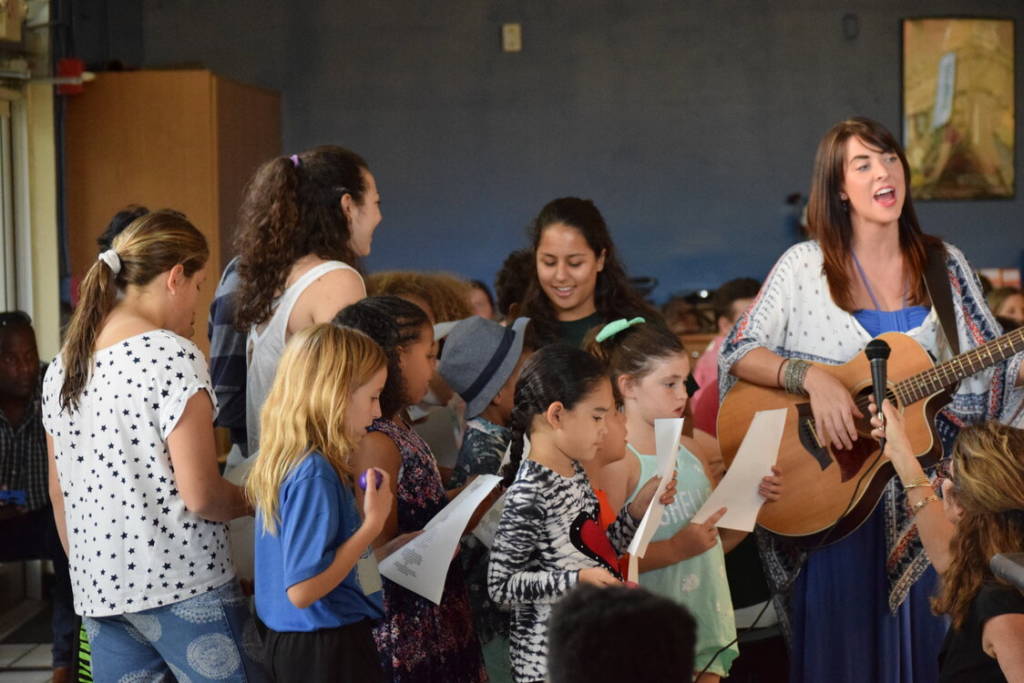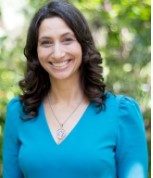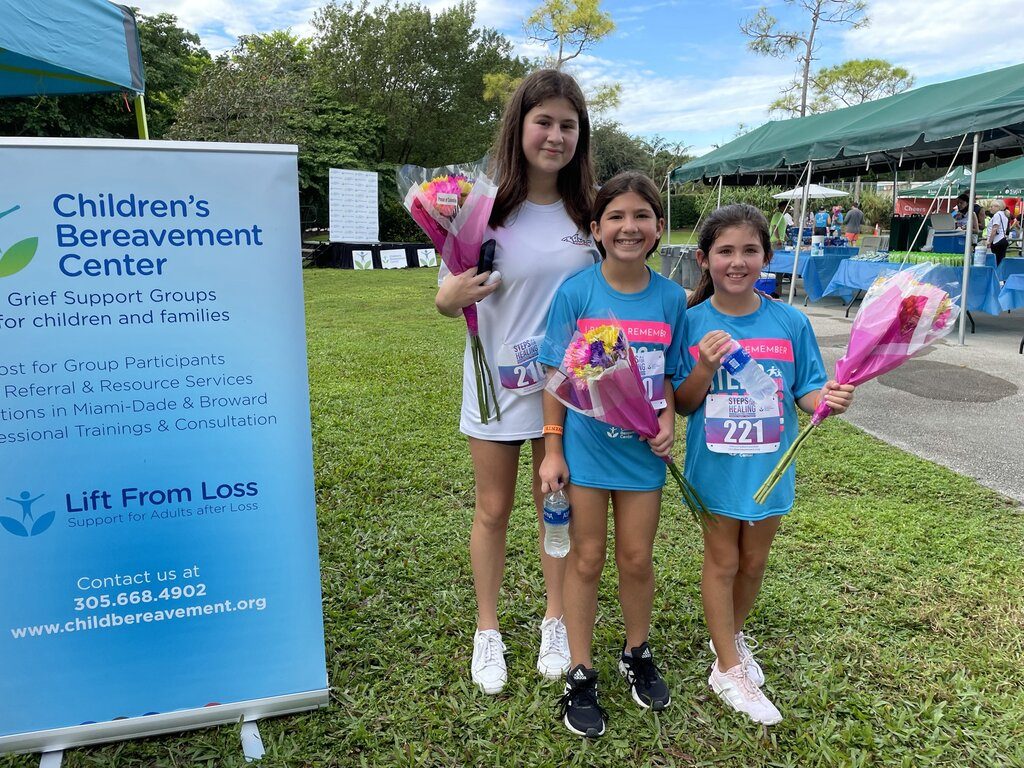Children’s Bereavement Center’s mission is to empower children and adults to adjust to life after the loss of a loved one within a supportive community of their peers and to promote healthful grief, healing and growth. Winn-Dixie has supported this nonprofit organization through the Community Bag Program.
Tell us about Children’s Bereavement Center.
The Children’s Bereavement Center (CBC) was founded in 1999 by two women who were seeing many children and teens dealing with the loss of a loved one in their clinical psychology practices. One was Dr. Mindy Cassel, who is still with CBC as an Advisor and as a Board member. They started very small with only one grief support group in someone’s house on a card table. By the end the first year, there were a hundred kids joining the support groups. What they soon learned was that they needed to expand and offer a full family model, which is what we have today.
CBC serves children ages four and up, including teens, and young adults and adults who have experienced a loss. Period. If they’ve experienced a loss of a loved one, whether it’s a spouse, a parent, or close friend, and whether it was yesterday, or it was five years ago, people can come to our support groups. We offer free grief support groups to anyone who has experienced a loss for as long as they want to come.
What’s incredible about the support groups is that over time, people see positive growth in the group members and in themselves, once they start attending groups. I facilitate a group every week and I see this positive growth over the course of months that I never thought was possible, especially as you see and hear what they’ve been through. Sometimes it’s just a matter of getting dressed or brushing their hair, and it might have taken six months for that. That’s progress. That’s growth. And it’s a beautiful thing.
In March 2020, we pivoted, as many organizations did, to online. We used to hold our groups in small private schools, public schools, charter schools, churches and synagogues in South Florida throughout Miami-Dade, Broward and Palm Beach counties. Once we pivoted to online, what we found is that we were drawing our attendance from around the country, and we’ve actually stayed that way today. In fact, in the group I was leading last night, we had a gentleman from New York, and it’s not rare anymore.

Our groups have members who have experienced different types of loss. There are people in the group whose loss is the result of a heart attack, some people experience COVID, some people experience the death of a loved one through either homicide or suicide. They’re all in the same group. And what I find so remarkable, and I didn’t think this until I started facilitating, is how much they learn from each other.
Somebody who has experienced a COVID loss feels such guilt for their family members lost. What did I do? I could have done more. I could have sent them to the hospital faster and so on. And it’s similar to those who’ve experienced a loss due to suicide. What else could I have done? And that self-blame is shared during group. They talk to each other, and they cry together. Then they laugh together, and they cry together. It’s a beautiful moment.
Our groups are separated by age, so we have elementary broken up by younger elementary and older elementary, middle school, senior high, young adults. And then we have adult groups. This is a little bit confusing with our name and we’re working on making an update to our name in the future.
We serve everybody, meaning we have adults who are attending groups who don’t have young children in their lives, and maybe experience a loss of a spouse. We call that our Lift from Loss program. What we’re seeing in that group more than anything else is people coming more than once a week now that we are online. It’s remarkable. And what they said in the group I attended last night, it was like they were scripted, which they weren’t, but they just kept saying how much the CBC has helped them through these terrible times.
We serve everybody, meaning we have adults who are attending groups who don’t have young children in their lives, and maybe experience a loss of a spouse.
What sets you apart from other nonprofits in your community?
In South Florida there are not many organizations that have the full family support model for grief support. There are churches or synagogues that will hold a support group. It’s often only for adults and our model is that we want to make sure that needs are shared by the entire family. Especially at a time when there’s so much loss in the whole country and the world, we want to make sure that everybody in the family knows it’s okay to talk about it. So, our model is for the full family, and it sets us apart.
The other thing that sets us apart is that we train about grief and loss in the community through different platforms. A lot of organizations don’t, but it’s really critical to everyone’s mental health to discuss grief and loss. Oftentimes people skip over the loss and talk about the depression and other things that are happening, but they don’t come back to the loss. What I’ve seen is that people will hold onto that grief and not know that they should talk about it or could talk about it or want to talk about it because they’re scared of it.
Also, we’ve been contracting with organizations to provide grief-informed training for their staff. All these individuals are going back into the workplace after two years who have often experienced their colleagues’ loss or their own losses. We can go into the organization to speak about grief and loss as it might be the only time people have the chance to do so. While CBC does not offer therapy, our groups are therapeutic, and we will refer out to therapy if a participant would like to attend both. Going to grief support groups and therapy are not mutually exclusive and we tell people it’s important that they can decide to do one or to do both, whatever is comfortable for them.

Tell us a story that illustrates the good work you are doing.
I was facilitating a children’s group, the elementary school group, going back a few months. We had several younger children in the group, and one was much younger. He must have been five years old, and his parent had died. He was having a hard moment in the group, and he had his head down. All of a sudden, one of the other group members who was a little older, saw it, another young boy who also lost his parent. And he said, “Hey man, we’re here for you. You’re gonna be okay.” This little one picks up his head and had the biggest smile on his face that the older kid had acknowledged him. He became engaged and talking, and that’s why we’re here because you have to know as a child, or an adult, that someone is there for you.
Oftentimes after the loss of a loved one, family and friends are very active that first month, checking in on them, maybe even the first six months. And then after that point, there’s a serious decline in people asking, “How are you doing? What can I do to help?” Our group allows people to come for many years, to be able to continue to come as long as they want to be surrounded by people who will always be there for support.
What is your greatest achievement or contribution to the community?
I think it’s the fact that we’re a nonprofit that’s been around since 1999 and our services are free. We don’t charge a penny to any of our participants. That in and of itself is a huge accomplishment that we’ve been able to make it for this long. And a lot of it has to do with supporters like your program, because we’re able to fundraise money to make sure that people don’t have to think about it. We want them to just be able to come and we never ask for funds.
I don’t know a lot of nonprofits that do that, that have been around for as long as we’ve been around, not asking for money and just offering a free service. So that’s a big accomplishment.
What do you want people to know about Children’s Bereavement Center?
I would say the most important thing is that we want people to know that we’re available to anybody. That is something we couldn’t say in 2019. It’s one of those silver linings of the pandemic that I’m really proud of; we now have the opportunity to help people anywhere.
I’ll bring up the Surfside building collapse tragedy. We had people from around the world that were impacted by that. It’s one of our only two specific groups. We have a perinatal and infant loss group for parents who lost a child in pregnancy or during the first year of life. And then we have a Surfside group for family members who lost somebody they loved in that tragedy. And I’ll tell you, it’s drawing people from everywhere.
To me, the most important thing that people need to know is that we’re here for you no matter where you are. We have groups in English and Spanish. We’re about to introduce Creole because the Haitian community is very large in South Florida.
How will you use the funds raised from the Winn-Dixie Community Bag Program?
The funds that we receive from the Winn-Dixie community bag program go to supporting our support groups. We want to make sure we can continue to offer those free groups. We follow the school schedule as far as holidays, but our groups operate year-round because grief does not take a summer break.
Nobody should ever grieve alone. That is critical. And especially now during a time when there’s been so much loss, we want to make sure that nobody grieves alone.
Is there anything you would like to add?
Thank you to Winn-Dixie! We’re thrilled to be able to get the information out there about our services and that they are free.
It’s so important to be able to understand grief and loss because death is something we all deal with no matter who you are, where you are in the world. Unfortunately, we all know somebody who dies at some point in our life. And it’s very important for us because that person doesn’t go away, that person is always in your heart. Nobody should ever grieve alone. That is critical. And especially now during a time when there’s been so much loss, we want to make sure that nobody grieves alone.

CEO Debra Albo-Steiger, LSCW, emphasizes that Children’s Bereavement Center provides grief support not just for children but for adults also. CBC has expanded to offer grief support groups beyond school-aged children through its adult division, Lift From Loss, so that young adults and adults are also able to seek help completely free.

